Find Help
More Items From Ergsy search
-

Redundancy Coaching Couch 7: Redundancy and Judgement.MTS
Relevance: 100%
-

Redundancy Coaching Couch 4:Redundancy and Language
Relevance: 100%
-

Redundancy Coaching Couch 5: Redundancy and Feedback.MTS
Relevance: 99%
-

Redundancy Coaching Couch 1: Redundancy and Presuppositions
Relevance: 99%
-

Redundancy Coaching Couch 2: Redundancy and Passion
Relevance: 98%
-

Redundancy Crusader and Annabel Kaye on communications in redundancy (5).MTS
Relevance: 95%
-

Redundancy Crusader and Annabel Kaye on scope and scale of redundancy (3).MTS
Relevance: 94%
-

Redundancy Crusader and Annabel Kaye on the Current Model of Redundancy (1).MTS
Relevance: 93%
-

Redundancy Crusader and Annabel Kaye on making redundancy a better experience (2).MTS
Relevance: 92%
-

What is the primary purpose of redundancy?
Relevance: 90%
-

What are the legal requirements for redundancy in the UK?
Relevance: 90%
-

What is the primary purpose of redundancy?
Relevance: 90%
-

What are the legal requirements for redundancy in the UK?
Relevance: 90%
-

How is redundancy pay calculated in the UK?
Relevance: 90%
-

Redundancy Coaching Couch 3: States
Relevance: 89%
-
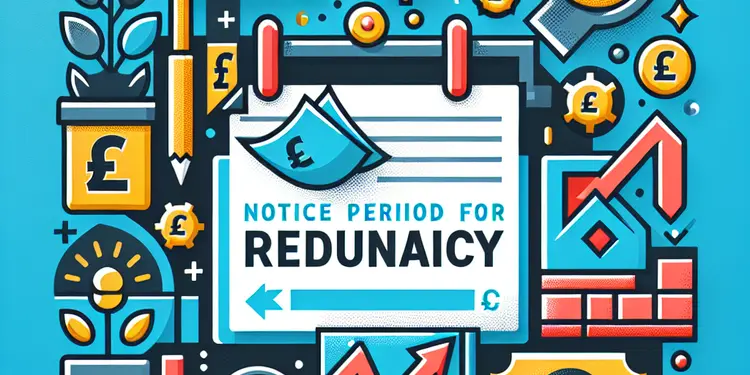
What is the notice period for redundancy?
Relevance: 89%
-

What is redundancy pay and who is eligible for it?
Relevance: 87%
-

What is redundancy pay and who is eligible for it?
Relevance: 87%
-
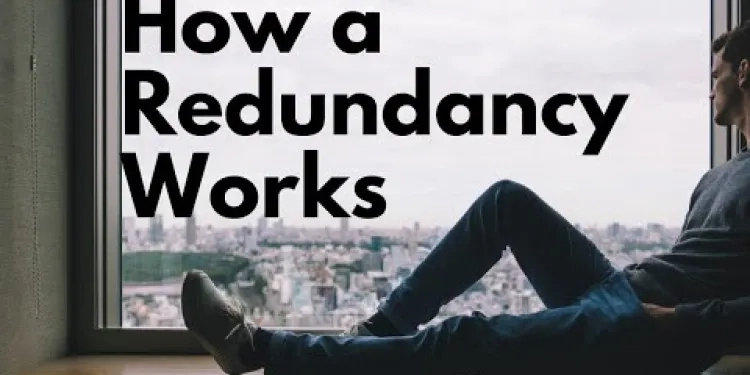
HOW A REDUNDANCY WORKS - General Information
Relevance: 87%
-
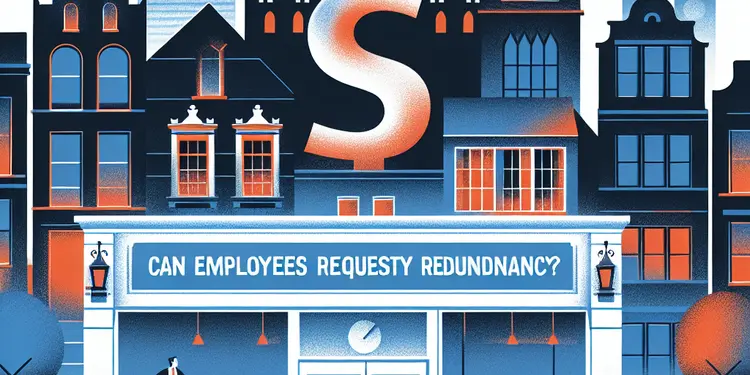
Can employees request voluntary redundancy?
Relevance: 87%
-

What is a fair selection process for redundancy?
Relevance: 87%
-

Can an employee appeal a redundancy decision?
Relevance: 86%
-

What is the role of trade unions in the redundancy process?
Relevance: 84%
-
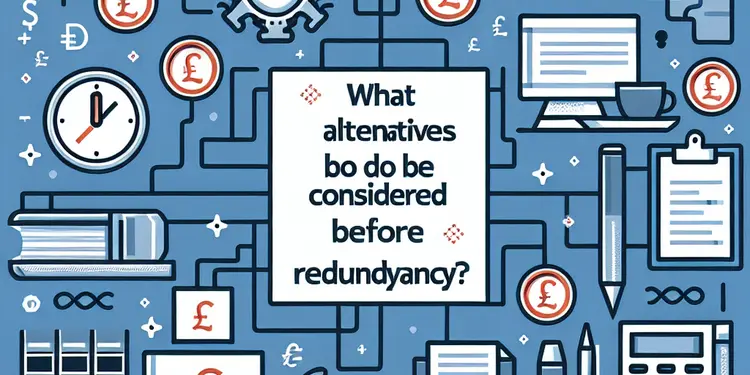
What alternatives should be considered before redundancy?
Relevance: 82%
-
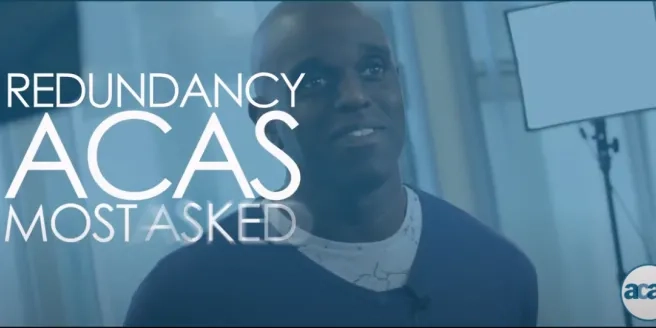
Frequently asked questions about redundancy from ACAS
Relevance: 82%
-

What happens if an employer does not follow the redundancy process?
Relevance: 82%
-

Are there any protections for employees on maternity leave during redundancy?
Relevance: 82%
-

What support can employees expect during redundancy?
Relevance: 81%
-
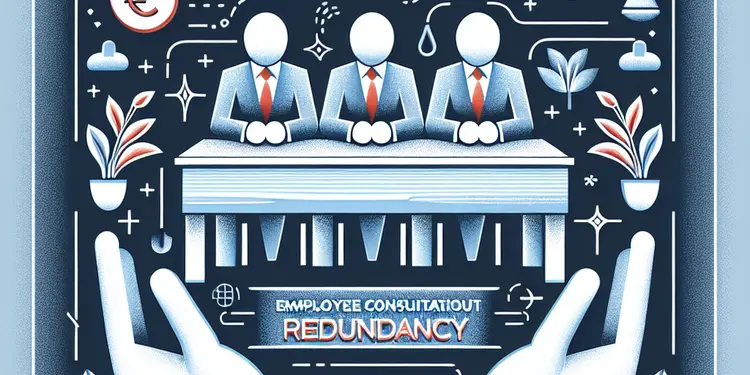
How should companies consult employees about redundancy?
Relevance: 81%
-

How should companies consult employees about redundancy?
Relevance: 80%
-

How should employers manage the emotional impact of redundancy on employees?
Relevance: 79%
-

Understanding Your Rights: Legal Support for Families During Economic Turbulence
Relevance: 27%
-
Do new variants affect COVID-19 testing?
Relevance: 18%
-

What is the deadline for filing a tribunal application?
Relevance: 13%
-

Upcoming Changes to Parental Leave Policies in the UK
Relevance: 13%
-

Why did I receive a tax refund letter from HMRC?
Relevance: 13%
-

What if my circumstances change?
Relevance: 13%
-

Am I considered an employee if I am a gig worker?
Relevance: 13%
-

Is job security a right for gig workers?
Relevance: 13%
-

What is a food bank?
Relevance: 13%
How redundancy works in the UK
In the United Kingdom, redundancy refers to the termination of an employee's contract due to factors such as the closure of a business, a reduction in the workforce, or the restructuring of an organization. The process of redundancy is governed by employment laws and regulations to ensure fair treatment of employees.
Employers obligations to employees in redundancy situations
When an employer considers making employees redundant, they must follow a structured and transparent procedure. This typically involves consulting with affected employees, providing relevant information about the reasons for redundancy, and exploring alternatives such as retraining or redeployment within the company.
Who is covered by UK redundancy law?
In the UK, employees with at least two years of continuous service are entitled to certain redundancy rights. These rights include receiving a statutory redundancy payment based on their length of service, notice periods, and, in some cases, the opportunity to move into a suitable alternative role within the organization.
Employers are obligated to conduct a fair selection process when choosing employees for redundancy, considering objective criteria such as skills, qualifications, and performance. Additionally, employers must consult with employee representatives or trade unions where applicable.
Employment tribunals
To further protect employees, the UK government has established employment tribunals where individuals can challenge their redundancy if they believe it to be unfair or not in compliance with employment laws. This legal framework aims to balance the needs of businesses with the rights of employees during the difficult process of redundancy.
Frequently asked questions about redundancy
- What is redundancy?
- Redundancy is a form of dismissal from employment when the job you are doing ceases to exist, and the employer doesn't replace it or reorganizes the workforce.
- How is redundancy different from being fired or laid off?
- Redundancy occurs when the job itself is no longer needed, whereas being fired or laid off may be due to personal performance or economic reasons.
- What is the legal definition of redundancy in the UK?
- Redundancy in the UK is defined under employment law as the situation where an employee is dismissed because the employer has ceased, or intends to cease, to carry on the business for which the employee was employed.
- What rights do employees have during a redundancy process?
- Employees have rights to consultation, notice, and often redundancy pay. They may also have the right to alternative employment within the same company.
- What is a redundancy consultation?
- It's a process where employers discuss with employees the reasons for redundancy, potential alternatives, and ways to mitigate the impact.
- How much redundancy pay am I entitled to?
- Redundancy pay is calculated based on your age, length of service, and weekly earnings. There are statutory redundancy pay calculations.
- Can I appeal against redundancy?
- Yes, you have the right to appeal if you believe the redundancy decision was unfair or there were procedural errors.
- Can I be made redundant while on maternity leave?
- While it is possible, there are strict regulations protecting employees on maternity leave. Employers must offer suitable alternative employment if available.
- Do part-time or fixed-term employees receive redundancy pay?
- Yes, part-time and fixed-term employees are entitled to redundancy pay if they meet the eligibility criteria.
- Can my employer make me redundant without consultation?
- Employers are legally required to consult with employees before making them redundant. Failure to do so can result in legal action.
- How much notice should I be given before being made redundant?
- Notice periods vary but are generally based on the length of service. Check your employment contract for specific details.
- Can I look for a new job during my redundancy notice period?
- Yes, you can and are encouraged to seek alternative employment during your notice period.
- What is "gardening leave"?
- Gardening leave is when an employee is asked to stay away from work during the notice period but still receives full pay and benefits.
- Is there a maximum age for receiving redundancy pay?
- No, there is no maximum age for receiving statutory redundancy pay.
- Can I take legal action if I feel I was unfairly selected for redundancy?
- Yes, you can appeal the decision internally and, if necessary, take your case to an employment tribunal.
- Can I negotiate my redundancy package?
- Yes, you can negotiate certain aspects of your redundancy package, such as the amount of redundancy pay or the terms of your departure.
- Can an employer rehire after making redundancies?
- Yes, but if the same or a similar role becomes available within a reasonable time, the employer should consider offering it to the employees made redundant.
- How does redundancy affect my benefits and tax?
- Redundancy pay is usually tax-free up to a certain limit, but ongoing benefits may be affected. It's advisable to consult with a tax professional.
- What support is available for retraining after redundancy?
- In some cases, employers may offer support for retraining. Additionally, government programs and initiatives may provide assistance.
- Can I claim benefits after redundancy?
- Yes, you may be eligible for state benefits, such as Jobseeker's Allowance. Eligibility criteria apply.
Please note that employment laws can change, and it's essential to seek up-to-date advice or consult with a legal professional for specific situations.
Next steps: Find your new role
After facing redundancy, finding a new job can be a challenging yet transformative process. Begin by updating your CV to highlight your skills and accomplishments. Sign up to online platforms like LinkedIn, to network with professionals in your industry and showcase your expertise. Actively search for job opportunities on job boards, company websites, and through recruitment agencies.
Consider expanding your skill set through relevant courses or certifications to enhance your marketability. Attend industry events, workshops, and seminars to stay updated on trends and make meaningful connections. Utilize your professional network for informational interviews and seek advice from mentors. Tailor your applications to each position, emphasizing how your experience aligns with the job requirements. Stay resilient, stay positive, and consider seeking guidance from career counselors or support groups to navigate the emotional challenges of the job search. Remember, each application and interview is an opportunity to showcase your strengths and find a new, fulfilling role. Good luck!
Understanding Redundancy in the UK
What is Redundancy?
Redundancy occurs when an employer needs to reduce their workforce. Redundancy can happen for various reasons including closing down the business, relocating, or changing the nature of the work. It is a form of dismissal that is distinct from being fired or let go for performance reasons.
Employee Rights
Employees who have worked continuously for their employer for at least two years are typically entitled to statutory redundancy pay. Additionally, employees have the right to a notice period, redundancy pay, time off to find a new job, and the right to appeal the redundancy decision or make a claim to an employment tribunal if they feel they have been unfairly dismissed.
Consultation Process
Employers must follow a fair redundancy process, which includes consulting with the employees. In organizations making 20 or more employees redundant, there must be a collective consultation lasting at least 30 days. During this period, the employer must inform and consult with employee representatives.
Calculating Redundancy Pay
Redundancy pay is calculated based on the employee's age, length of service, and weekly pay (subject to a statutory cap). The basic formula is:
- Half a week's pay for each full year the employee was under 22
- One week's pay for each full year they were 22 or older but under 41
- One and a half week's pay for each full year they were 41 or older
Notice Periods
Employees are entitled to a minimum notice period before their employment ends due to redundancy. This period varies depending on how long they have been employed. Typically, it's one week’s notice if employed between one month and two years; one week’s notice for each year if employed between two and twelve years; and twelve weeks’ notice if employed for twelve years or more.
Support and Assistance
Redundant employees can seek help and advice from various sources, including their local Jobcentre Plus, professional unions, and legal advisors. The ACAS (Advisory, Conciliation and Arbitration Service) also provides free and impartial information and advice to both employers and employees.
How Redundancy Works in the UK
In the UK, redundancy means losing your job because the company is closing, cutting jobs, or changing how it works. There are rules to make sure this is fair for workers.
What Employers Must Do
When a company wants to make people redundant, they have to follow steps to be open and honest. This means talking to the people losing their jobs, explaining why it is happening, and looking at other options like teaching new skills or finding a different job in the company.
Who Has Redundancy Rights?
In the UK, if you have worked at a company for at least two years, you have rights. You can get a payment for redundancy based on how long you worked there. You should get notice before your job ends. Sometimes you can get another job in the company.
Companies must be fair when choosing who loses their job. They should look at things like skills and how well you do your job. If your workplace has employee helpers or unions, the company should talk to them too.
Employment Tribunals
If you think you lost your job unfairly, you can go to an employment tribunal. This is a special group that listens to your case. The aim is to find a fair balance between what companies need and your rights as a worker during redundancy.
Tools like reading aids, voice readers, and talking with someone can make understanding this process easier.
Frequently Asked Questions About Job Loss
- What is redundancy?
- Redundancy means you lose your job because the company no longer needs it. The company does not replace the job or change the staff.
- How is redundancy different from being fired or laid off?
- Redundancy happens when the job is not needed anymore. Being fired or laid off can be because of how someone worked or money problems.
- What does redundancy mean in the UK?
- In the UK, redundancy means you lose your job because the company stops the work you were doing.
- What rights do I have if I am made redundant?
- You have rights to a discussion, notice time, and often get pay. You may be offered a different job in the same company.
- What is a redundancy consultation?
- This is a meeting where your company talks to you about why you are losing your job and looks at other options.
- How much redundancy pay do I get?
- Your redundancy pay depends on your age, how long you have worked, and your weekly pay. There are rules on how to calculate this.
- Can I say no to redundancy?
- Yes, you can disagree if you think your job loss is unfair or not done properly.
- Can I be made redundant while on maternity leave?
- Yes, but there are strict rules to protect you. If there's another job, your employer must offer it to you.
- Do part-time or fixed-term workers get redundancy pay?
- Yes, if they qualify, part-time and fixed-term workers can get redundancy pay.
- Can I be made redundant without a consultation?
- No, your company must talk to you first. If not, you can take legal action.
- How much notice do I get before redundancy?
- Your notice time depends on how long you have worked. Check your contract to know more.
- Can I look for a new job while waiting for redundancy?
- Yes, you can look for a new job during your notice time.
- What is "gardening leave"?
- Gardening leave is when you do not work during your notice but still get your full pay.
- Is there an age limit for redundancy pay?
- No, there is no age limit to receive redundancy pay.
- Can I take legal action if I am unfairly chosen for redundancy?
- Yes, you can complain and, if needed, go to a special court for work problems.
- Can I negotiate my redundancy package?
- Yes, you can talk about your redundancy pay and leaving terms.
- Can a company hire again after making redundancies?
- Yes, if a similar job comes back, the company should offer it to someone they made redundant.
- How does redundancy affect my money and tax?
- Redundancy pay is usually tax-free up to a limit, but your other benefits might change. Talk to a tax expert to know more.
- Can I get help to learn new skills after redundancy?
- Sometimes companies help with retraining. Government programs might help too.
- Can I claim benefits after losing my job?
- Yes, you might get help like Jobseeker's Allowance if you qualify.
Remember, work laws can change. It's important to get the latest advice or talk to a lawyer for your situation.
Next Steps: Find Your New Job
After losing your job, finding a new one can be hard but also a chance to change. Start by updating your CV with your skills and successes. Join online sites like LinkedIn to meet people in your field and show what you can do. Look for job openings on websites, company pages, and through job agencies.
Think about learning new things with courses or certificates to improve your skills. Go to events, workshops, and seminars to learn about job trends and connect with people. Use your professional network to talk to others for advice and help. Change your applications to fit each job, showing how your experience matches the job needs. Stay strong, keep positive. You might go to a career counselor or join a support group to help with the feelings that come with job searching. Each application and interview is a chance to show your strengths and find a new, good job. Good luck!
Understanding Redundancy in the UK
What is Redundancy?
Redundancy is when a company does not need some workers anymore. This can happen if the company closes, moves, or changes the type of work they do. It is different from being fired for doing a bad job.
Employee Rights
If you have worked for a company for at least two years, you might get redundancy money. You also have the right to be told in advance, get time to find a new job, and ask questions if you think it is unfair. You might also talk to a special work court if needed.
Consultation Process
Companies have to talk to their workers about redundancy. If they plan to let go of 20 or more workers, they must talk to worker representatives for at least 30 days.
Calculating Redundancy Pay
Redundancy money depends on your age, how long you worked, and your weekly pay. Here is how it works:
- Half a week's pay for each year you were under 22
- One week's pay for each year you were 22 to 40
- One and a half week's pay for each year you were over 41
Notice Periods
You must be told at least a few weeks before your job ends because of redundancy. How long depends on your job time: - At least one week if you worked 1 month to 2 years. - One week for each year if you worked 2 to 12 years. - Twelve weeks if you worked over 12 years.
Support and Assistance
If you lose your job, you can get help from places like Jobcentre Plus, unions, and legal helpers. The group ACAS can also give free advice to workers and employers.
Frequently Asked Questions
What is redundancy?
Redundancy is a form of dismissal from your job, which happens when employers need to reduce their workforce. It can occur for various reasons including company restructuring or financial difficulties.
How is redundancy decided?
Employers follow a fair process, which typically includes consultation, consideration of alternative employment within the company, and objective selection criteria to decide which employees are made redundant.
What is a consultation period?
A consultation period is a time during which employers discuss the redundancy with employees or their representatives. It ensures that employees are informed and have the chance to discuss the process and propose alternatives to redundancy.
How much notice will I get if I am made redundant?
By law, the notice period depends on how long you've been employed. It's at least one week's notice if you have been employed between one month and two years, one week's notice for each year if employed between two and twelve years, and twelve weeks notice if employed for twelve years or more.
What is redundancy pay?
Redundancy pay is compensation given to employees who are dismissed due to redundancy. It is calculated based on your age, length of service, and weekly pay, subject to statutory limits.
Am I entitled to redundancy pay?
To qualify for redundancy pay, you must have been employed continuously by your employer for at least two years. The amount also depends on your age and length of service.
Can I be made redundant if I am on maternity leave?
Yes, you can be made redundant while on maternity leave, but the redundancy must be genuine and not related to your maternity leave. Employers must justify that the redundancy is based on business needs.
What is suitable alternative employment?
Employers are required to offer 'suitable' alternative employment within the company if such positions are available. 'Suitable' means the new job role should not significantly differ from your previous role.
What happens if I refuse suitable alternative employment?
If you unreasonably refuse an offer of suitable alternative employment, you may lose your right to redundancy pay. Reasonableness depends on specific circumstances, including the role's suitability and your reasons for refusal.
What are my rights during the redundancy process?
You have the right to a fair and transparent redundancy process, fair selection criteria, adequate notice, redundancy pay (if eligible), and to be consulted during the process.
How do I know if my redundancy is fair?
A fair redundancy process should include proper consultation, consistent and objective selection criteria, and offers of suitable alternative employment if available. If you believe the process was unfair, you may seek advice or challenge the redundancy.
Can I claim unfair dismissal if I am made redundant?
If you believe the redundancy process was not fair, you might be able to claim unfair dismissal, provided you've worked for at least two years. Specific situations like a lack of proper consultation or discriminatory practices could justify such a claim.
What should I do if I receive a redundancy notice?
Read the notice carefully, understand your rights, and participate in consultation meetings. It's advisable to seek legal or professional advice to ensure you are treated fairly and receive all entitled benefits.
How is redundancy pay calculated?
Redundancy pay is calculated based on your age, length of service, and weekly pay up to a statutory limit. The formula is: half a week's pay for each full year you were under 22, one week's pay for each full year you were 22 or older but under 41, and one and a half week's pay for each full year you were 41 or older.
Can I work somewhere else while I am under redundancy notice?
Yes, during your notice period, you can look for other work. You are also entitled to a reasonable amount of paid time off to attend job interviews or training for future employment.
What is redundancy?
Redundancy is when someone loses their job because the job is no longer needed. Sometimes companies need fewer people to do the work and this is why redundancy happens.
Support Tips:
- Ask someone for help if you don't understand.
- Use a dictionary to look up hard words.
- Talk to a teacher or parent for more information.
Redundancy means losing your job because your boss needs fewer workers. This can happen if the company changes how it works or has money problems.
How do people choose who loses their job?
Bosses must do things in a fair way. They usually talk to their workers, look for other jobs they can do in the company, and use fair rules to choose which workers will lose their jobs.
What is a consultation period?
A consultation period is a time to talk and share ideas. People can say what they think and ask questions. This time helps everyone understand and make good choices.
Helpful Tips:
- Use pictures to explain ideas.
- Ask someone when you don’t understand.
- Take notes to remember important things.
A consultation period is a time when bosses talk to workers about losing jobs. It helps workers know what is happening. They can also talk about other ideas instead of losing their jobs.
How long will I know before losing my job?
If you might lose your job, your boss should tell you before it happens. Here is how it usually works:
- Less than 2 years at the job: You should get at least 1 week's notice.
- 2 to 12 years at the job: You should get 1 week of notice for every year you worked.
- More than 12 years at the job: You should get at least 12 weeks' notice.
If you feel worried, it can help to talk to someone about it. You can also write down any questions you have before talking to your boss.
The amount of notice you need to give depends on how long you've had your job.
If you've been working for 1 month to 2 years, you need to give at least 1 week's notice.
If you've been working for 2 to 12 years, you give 1 week's notice for every year you've worked. So, if you worked for 3 years, you give 3 weeks' notice.
If you've worked for 12 years or more, you give 12 weeks' notice.
Ask a friend or family member if you need help with this. You can also use a calendar or a diary to count the weeks.
What is redundancy pay?
Redundancy pay is money you get if you lose your job because the job is no longer needed. It's a type of payment to help you while you look for a new job.
If this is hard to read, you can ask someone to help you understand or use tools that read text out loud. It’s okay to ask for help!
Redundancy pay is money you get if you lose your job because it is no longer needed. The amount you get depends on how old you are, how long you worked there, and how much you earn each week. There are rules about how much you can get.
Can I get money if I lose my job?
If you lose your job and your boss says it's because they have no more work for you, you might get some money to help you. This is called redundancy pay.
To get this money, you need to have been working for the same boss for at least two years without stopping.
The amount of money you get depends on how old you are and how long you've worked for your boss.
If you're not sure about redundancy pay, you can ask someone you trust to help explain it. You can also use tools like a calculator or talk to a friendly person who knows about jobs and money.
Can I lose my job while on maternity leave?
Yes, you can lose your job while you are on maternity leave. But it must be for a real reason, not because you are on leave. Your boss has to show that the job loss is because of the needs of the business.
What is a good job change?
Your boss must give you another job if they have any. This new job should be similar to your old one. It should not be too different.
What Happens If I Say No to a New Job That Fits Me?
If you say no to a new job that is right for you, it might cause problems. Here are some things you can do:
- Ask someone to explain why the job is good for you.
- Talk to a friend or family member about what you are worried about.
- Use a tool like a list to write down good and bad things about the job.
Remember, it is okay to ask for help if you don't understand.
If you say "no" to a new job offer that is good for you, you might not get money if your old job ends. Whether saying "no" is okay depends on the new job's details and why you don't want it.
What can I do if I might lose my job?
If you're worried about losing your job, it's important to know your rights. Here are some simple steps to help you:
- Ask for help: Talk to someone you trust, like a family member or friend.
- Get advice: You can contact a local advice center or a union for support.
- Know your rights: Find out what you're entitled to, like money or help finding a new job.
Remember, you are not alone, and there are people and places that can help you during this time.
You have the right to a fair process if you are losing your job. The process should be clear and honest. You should know how they choose who leaves. You should get enough warning. You might get money if you qualify. You should be able to talk to them about it.
How can I tell if losing my job is fair?
Here’s how to check:
- Was there a good reason for the job cuts?
- Did they follow fair rules for choosing people?
- Did they talk to you about it?
- Were you given enough notice?
- Did they offer any help to find a new job?
If you’re worried, you can:
- Talk to your boss.
- Ask for help from a union.
- Use online advice tools like a job center website.
A fair job layoff process should include talking with workers, using clear ways to choose who stays, and offering other jobs if there are any. If you think your layoff was not fair, you can ask for help or talk to someone about it.
Can I say it was not fair if I lose my job because of redundancy?
If you lose your job because the business does not need your role anymore, this is called redundancy.
Sometimes, it might feel unfair. You might want to ask for help to check if it was done the right way.
Here are some things you can do:
- Talk to someone you trust, like a friend or family member.
- Speak to a person who knows about job rules, like a union or an advice helpline.
- Write down everything that happened and keep all letters and emails from your job.
These steps can help you understand if it is okay to say it was not fair.
If you think your job ended unfairly, you might be able to say it was unfair dismissal. This is possible if you've worked for the company for at least two years. If your employer did not talk to you properly about the job ending or if they treated you unfairly because of who you are, you might have a reason to make this claim.
What to Do If You Get a Redundancy Notice
Getting a redundancy notice means your job might end soon. Here are some steps to help you:
- Ask someone you trust, like a friend or family member, to explain the notice if you find it confusing.
- Talk to your boss or the human resources (HR) department. Ask them why your job is ending and what will happen next.
- Check if you can get any money. This is called redundancy pay. You get this when you lose your job.
- Look for a new job. You can make a resume with all the jobs you've done before.
- Use a computer or phone to search for jobs online.
- Ask for help. Friends, family, or job centers can support you in finding work.
Remember, you are not alone. There are people and services that can help you.
Read the notice slowly and carefully. Try to understand what it says. It's important to know your rights. Go to meetings where people talk about these things. It can help to ask an expert or a professional for advice. This way, you make sure you are treated nicely and get everything you should have.
How do you work out redundancy pay?
Redundancy pay is money you get if your job ends because your work is no longer needed. Here is how you can work it out:
1. First, see how long you have worked there.
2. Next, know your age. This can change the pay.
3. Last, check your weekly pay before taxes.
You usually get a week's money for every year you worked, but this can change. If you find this hard, use a calculator online to help. Family, friends, or a helper can also be good to ask.
When you lose your job because it's not needed anymore, you might get some money. This is called redundancy pay. How much money you get depends on three things: how old you are, how many years you worked there, and how much you earn each week. But there is a limit on how much weekly pay they use to work this out.
Here's how they count it:
- For every full year you worked there before you turned 22, you get half a week's pay.
- For every full year you worked there between ages 22 and 40, you get one week's pay.
- For every full year you worked there at age 41 or older, you get one and a half week's pay.
To help understand, you could use a calculator or ask someone you trust to go over it with you.
Can I get another job if I am told I might lose my current job?
If you think you might lose your job, you can start looking for a new job. This is called being "under redundancy notice".
You can talk to your boss and ask if it is okay to work part-time somewhere else while you still have your current job.
Getting help:
- Talk with a friend or family member for advice.
- Use online job search tools to find new jobs.
- Write a list of new jobs you would like to try.
Yes, you can look for another job while working your notice period. You can also take some paid time off to go to job interviews or do training for a new job.
A helpful tool when searching for a new job is to make a list of job places to apply to. You can also ask a family member or friend to practice interview questions with you. It's okay to ask someone for help if you need it.
Useful Links
Have you found an error, or do you have a link or some information you would like to share? Please let us know using the form below.
-->
This website offers general information and is not a substitute for professional advice.
Always seek guidance from qualified professionals.
If you have any medical concerns or need urgent help, contact a healthcare professional or emergency services immediately.
Some of this content was generated with AI assistance. We’ve done our best to keep it accurate, helpful, and human-friendly.
- Ergsy carfully checks the information in the videos we provide here.
- Videos shown by Youtube after a video has completed, have NOT been reviewed by ERGSY.
- To view, click the arrow in centre of video.
- Most of the videos you find here will have subtitles and/or closed captions available.
- You may need to turn these on, and choose your preferred language.
- Go to the video you'd like to watch.
- If closed captions (CC) are available, settings will be visible on the bottom right of the video player.
- To turn on Captions, click settings .
- To turn off Captions, click settings again.
More Items From Ergsy search
-

Redundancy Coaching Couch 7: Redundancy and Judgement.MTS
Relevance: 100%
-

Redundancy Coaching Couch 4:Redundancy and Language
Relevance: 100%
-

Redundancy Coaching Couch 5: Redundancy and Feedback.MTS
Relevance: 99%
-

Redundancy Coaching Couch 1: Redundancy and Presuppositions
Relevance: 99%
-

Redundancy Coaching Couch 2: Redundancy and Passion
Relevance: 98%
-

Redundancy Crusader and Annabel Kaye on communications in redundancy (5).MTS
Relevance: 95%
-

Redundancy Crusader and Annabel Kaye on scope and scale of redundancy (3).MTS
Relevance: 94%
-

Redundancy Crusader and Annabel Kaye on the Current Model of Redundancy (1).MTS
Relevance: 93%
-

Redundancy Crusader and Annabel Kaye on making redundancy a better experience (2).MTS
Relevance: 92%
-

What is the primary purpose of redundancy?
Relevance: 90%
-

What are the legal requirements for redundancy in the UK?
Relevance: 90%
-

What is the primary purpose of redundancy?
Relevance: 90%
-

What are the legal requirements for redundancy in the UK?
Relevance: 90%
-

How is redundancy pay calculated in the UK?
Relevance: 90%
-

Redundancy Coaching Couch 3: States
Relevance: 89%
-

What is the notice period for redundancy?
Relevance: 89%
-

What is redundancy pay and who is eligible for it?
Relevance: 87%
-

What is redundancy pay and who is eligible for it?
Relevance: 87%
-

HOW A REDUNDANCY WORKS - General Information
Relevance: 87%
-

Can employees request voluntary redundancy?
Relevance: 87%
-

What is a fair selection process for redundancy?
Relevance: 87%
-

Can an employee appeal a redundancy decision?
Relevance: 86%
-

What is the role of trade unions in the redundancy process?
Relevance: 84%
-

What alternatives should be considered before redundancy?
Relevance: 82%
-

Frequently asked questions about redundancy from ACAS
Relevance: 82%
-

What happens if an employer does not follow the redundancy process?
Relevance: 82%
-

Are there any protections for employees on maternity leave during redundancy?
Relevance: 82%
-

What support can employees expect during redundancy?
Relevance: 81%
-

How should companies consult employees about redundancy?
Relevance: 81%
-

How should companies consult employees about redundancy?
Relevance: 80%
-

How should employers manage the emotional impact of redundancy on employees?
Relevance: 79%
-

Understanding Your Rights: Legal Support for Families During Economic Turbulence
Relevance: 27%
-
Do new variants affect COVID-19 testing?
Relevance: 18%
-

What is the deadline for filing a tribunal application?
Relevance: 13%
-

Upcoming Changes to Parental Leave Policies in the UK
Relevance: 13%
-

Why did I receive a tax refund letter from HMRC?
Relevance: 13%
-

What if my circumstances change?
Relevance: 13%
-

Am I considered an employee if I am a gig worker?
Relevance: 13%
-

Is job security a right for gig workers?
Relevance: 13%
-

What is a food bank?
Relevance: 13%


